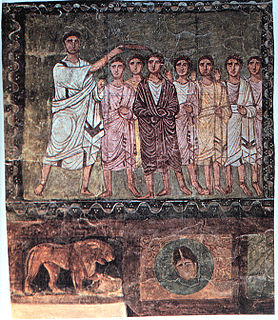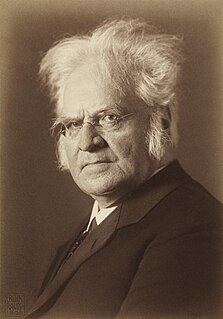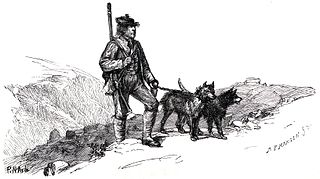Creation
The two spirits
The poem starts out at the beginning of history, with two spirits watching and arguing over the newly created earth. One of them, Phun-Abiriel, is dismayed, because he is eager to create on his own, but unlike God, his thoughts do not take shape. In the process, he also wishes to see God, but can't. Phun-Abiriel's friend, Ohebiel, patiently explains to him that the spirits are not able to see the eternal, and that Phun-Abiriel is considered a newborn spirit or a rash youth. Anyway, Ohebiel loves him, but can't help him from brooding. As they talk, the heavenly host approaches, led by the eldest of spirits, Akadiel.
Life on earth
Then, Akadiel and the host witness the birth of life, as recalled in Genesis, over a period of six days. At the end of this part, Akadiel holds his speech to the still-sleeping human couple, demanding of them that they shall be rulers over themselves first, and then over the creation as such, and honour God in the creation and in themselves.
The soul-giving
Phun-Abiriel (his names formed of the names Phuniel and Abiriel, telling of the two sides of his character), still broods over the sleeping humans below him. He makes up his mind that he would rather rule the earth as a man than be the most lowly of heavenly spirits. He decides he will become the soul of the sleeping man, and the little "geist" that were in man before him, shall become "dream", as he himself will be called "thought". Phun-Abiriel then descends and merges with the sleeping Adam, and as this happens, he ultimately forgets his spiritual self and his background. Ohebiel, watching this, despairs, and wonders what will happen if the woman awakes without soul, and what kind of monster would come from the union of the two. To hinder this, she merges with Eve, after the advice of Akadiel, and she sacrifices herself on behalf of humanity with the words: "Man, hope!" The history of humanity, at this point, can proceed as planned.
The bewildering
This second part is the longest section of the epic poem. It follows the life of Adam and Eve, and their recognition as kindred spirits; this section also details Adam's fall in pride and Wergeland's version of the fall of man, here solely on the male account. Then, there are parts of Biblical history detailed, such as Cain and Abel, the great flood, and so on.
Origin of lordships
This part consists of two monologues, one considering secular power, and one considering clerical power, over people's goods and thoughts.
Glimpses of light: the Golden Age
This part tells of the archetypical man, who is both a king and a sage, along with a culture-hero, who teaches people to build cities, till the earth, govern justly and look into themselves for the truth. The woman teaches people agriculture, and is hailed as Isis, Ceres, Frigga and Athena. The man is hailed as Osiris, Crishna, Fu Hsi in China, Baal, Odin, Tuisto, Dionysus, Herakles, Zeus and Saturn.
As Man works to enlighten humanity, he is also acknowledged as Kneph, Akhar, Zerouane-Akherene, Huang Di, Fta (Siamese ephitet to deities), Nyame, Kutka, Sommonadokom, Allfađir and eventually Eloah. In the process, the vedam, the Zen, the I Ching, and the ten commandments are established as laws and guidelines. The last names to be given of this amalgam of earthly wisdom are: Hermes, Mimir, Zerdust, Yu the Great, Yao (ruler), Buddha, Manu (Hinduism), Confucius and Moses.
In the end, Akadiel approaches and foretells how this golden age of wisdom and prosperity eventually will corrupt itself to the Iron Age, with chained thralls and manipulation. He then tells that humanity, the "abiriels", eventually will rise and cast off their chains, to make a new priesthood in freedom and brotherly love.
Ruling classes
This part is a return to the theme of the lords and the priests, telling of exploitation and greed on behalf of the few. The voices from the people answer the demands of the lordships.
Interlude of hearts
This part contains scenes of romance, telling how individuals in love with one another can disregard their own potential differences between casts and classes.
Power and deceit
This section tells how the rulers and priests continue their treatment of ordinary people by means of practices such as human sacrifice and dictatorship. This part contains 28 different scenes.
Breakthrough for the human spirit
Philosophers, mostly Greeks, are introduced into the epic poem here; among them are Epicurus, Democritus, Aristotle and Plato. Plato is hailed by Akadiel as the one who perceives most clearly God's overall plan for humanity and the coming of Christ. Also, some of the Jewish sects are introduced, such as the Pharisees and the Sadducees. In the end, the prophet Mika foretells the coming of Christ.
Heaven and Hell
This part tells how Wergeland envisioned the difference between the blessed and the unblessed. Characters from the "power and deceit" section are introduced again; as the tortured ones rejoice, the former rulers recognize themselves as condemned, although they are all in the same place. In Wergeland's spirit-world, hell is a personal state of circumstances.
Salvation
This third main part concentrates mostly on Jesus and the story afterwards. Jesus is introduced mourning the history of the human race and their toils; he is comforted by Akadiel. Under Akadiel's guidance, Jesus walks out to his task, in a sequence based closely on the gospels. During this section, Jesus delivers a speech, based loosely on the Sermon on the Mount, where he tells the human spirit to acknowledge itself as what it is, through love.
This last section of the poem was written for the revised version of 1845.
First great victory of Christianity
The ironic title of this section refers to the Roman Empire`s transition to Christianity in the fourth century. Wergeland states that the Roman emperor is getting troubled by this sudden onset of peaceful ideology and the denial of power. The emperor then decides to get baptized, because he will then have sway over his people once more. The peaceful approach of Christianity, says Wergeland, is toppled and abused by the powers that be.
Spiritual resurrection of Christ
Here, the poet himself appears, sitting on a hilltop easter morning and contemplating the turn of events the last 1845 years from the coming of Christ to the then-present day. Akadiel addresses Wergeland, and the poet is allowed a glimpse one thousand years into the future as a means of seeing the conditions the world and humanity are in at that time. He awakens every century to see for himself what has happened and witnesses spiritual and political progress and liberation. The conditions he sees include the end of slavery; the liberation of women; and all Christian fractions merging into one, thus making the papacy obsolete, as the last pope dies 600 years from 1845. Eventually, all humanity becomes "Christian, each according to the colour of his own character". The poem ends in a praise to God, and the poet awakes, reconciled.

Christ, used by Christians as both a name and a title, is synonymous with Jesus. It is also used as a title, in the reciprocal use "Christ Jesus", meaning "the Messiah Jesus", and independently as "the Christ". The Pauline epistles, the earliest texts of the New Testament, often refer to Jesus as "Christ Jesus" or "Christ".

In Abrahamic religions, a messiah or messias is a saviour or liberator of a group of people. The concepts of mashiach, messianism, and of a Messianic Age originated in Judaism, and in the Hebrew Bible, in which a mashiach is a king or High Priest traditionally anointed with holy anointing oil.

Peter Wessel Zapffe was a Norwegian metaphysician, author, lawyer and mountaineer. He is often noted for his philosophically pessimistic and fatalistic view of human existence—his system of philosophy was inspired by the German philosopher Arthur Schopenhauer—as well as his firm advocacy of antinatalism. His thoughts regarding the error of human life are presented in the essay "The Last Messiah". This essay is a shorter version of his best-known and yet to be translated work, the philosophical treatise On the Tragic.

Jan Kjærstad is a Norwegian author. Kjærstad is a theology graduate from MF Norwegian School of Theology and the University of Oslo. He has written a string of novels, short stories and essays and was editor of the literary magazine Vinduet. He has received a number of prizes, the most important being the Nordic Council Literature Prize, which he received for the perspectivist trilogy about the TV personality Jonas Wergeland.

Bjørnstjerne Martinius Bjørnson was a Norwegian writer who received the 1903 Nobel Prize in Literature "as a tribute to his noble, magnificent and versatile poetry, which has always been distinguished by both the freshness of its inspiration and the rare purity of its spirit", becoming the first Norwegian Nobel laureate. He was a prolific polemicist and extremely influential in Norwegian public life and Scandinavian cultural debate. Bjørnson is considered to be one of The Four Greats among Norwegian writers, the others being Henrik Ibsen, Jonas Lie, and Alexander Kielland. Bjørnson is also celebrated for his lyrics to the Norwegian National Anthem, "Ja, vi elsker dette landet". Composer Fredrikke Waaler based a composition for voice and piano (Spinnersken) on text by Bjørnson, as did composer Anna Teichmüller.
This article contains information about the literary events and publications of 1829.

Henrik Arnold Thaulow Wergeland was a Norwegian writer, most celebrated for his poetry but also a prolific playwright, polemicist, historian, and linguist. He is often described as a leading pioneer in the development of a distinctly Norwegian literary heritage and of modern Norwegian culture.

Johan Sebastian Cammermeyer Welhaven was a Norwegian author, poet, critic and art theorist. He has been considered "one of the greatest figures in Norwegian literature."
Messianism is the belief in the advent of a messiah who acts as the savior of a group of people. Messianism originated as an Abrahamic religious belief, but other religions have messianism-related concepts. Religions with a messiah concept include Judaism (Mashiach), Christianity (Christ), Islam, Zoroastrianism (Saoshyant), Buddhism (Maitreya), Hinduism (Kalki), Taoism, and Bábism.
Ynglingatal or Ynglinga tal is a Skaldic poem cited by Snorri Sturluson in the Ynglinga saga, the first saga of Snorri's Heimskringla. Þjóðólfr of Hvinir (Thjodolf), who was a poet for Harald Fairhair, is traditionally credited with its authorship. Snorri quotes frequently from this poem and cites it as one of the sources of the saga. The composition of the poem is dated to the 9th c.

Knut Ødegård is a Norwegian poet.

Nicolai Wergeland was a Norwegian minister, writer and politician, and a member of the Norwegian Constituent Assembly at Eidsvoll that wrote the Constitution of Norway on 17 May 1814. He was elected as one of two delegates from Kristiansand to the Eidsvoll Assembly in 1814. He represented the unionist side, and came very well prepared to Eidsvoll, bringing his own constitution draft. Along with him from Kristiansand came wholesaler Ole Clausen Mørch.

Joseph Frantz Oscar Wergeland was a Norwegian military officer, cartographer and skiing pioneer.

Erik Vullum was a Norwegian journalist, writer and politician for the Liberal Party.

Olaf Skavlan was a Norwegian literary historian and playwright.

Per Gynt is a Norwegian fairy tale which originated in the traditional region of Gudbrandsdal.

Lorentz Henrik Segelcke Dietrichson was a Norwegian poet and historian of art and literature.

Mor Sæther, was a Norwegian "klok kone", that is, a herbalist. She is one of the best known within her profession in Norway.
Papegøien is a farce from 1835, written by Norwegian writer Henrik Wergeland under the pseudonym "Siful Sifadda".

Heinrich Arnold Thaulow was a physician known for the introduction of balneotherapy in Norway. Thaulow founded Sandefjord Spa in Sandefjord in 1837. He was Sandefjord's first physician. He also made the first donation to the city in 1875, when the Thaulow fountain was donated to the city. The fountain is located at Christopher Hvidts Plass in the city center of Sandefjord.
















